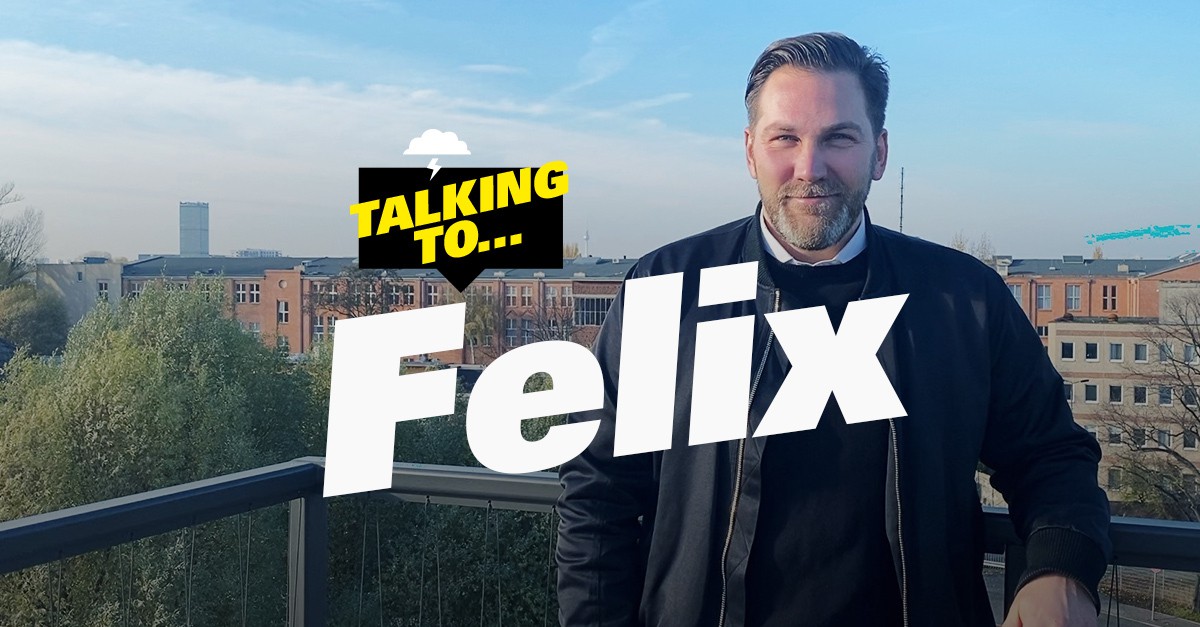
Felix, born and raised in Troisdorf, somewhere between Bonn and Cologne, is a true Rhinelander. Despite stations in Hamburg and his current place of residence in Berlin, he has sworn eternal loyalty to the Rhineland. A principle that also applies to his childhood love, the 1. FC Cologne. After a wild time at school, Felix enrolled at the TU Berlin to study art history, modern history and philosophy.
In 2006, he moved to the IMK to complete his diploma in marketing and communications and, in parallel, founded a gallery with his brother with offices in Berlin and New York. After first positions in brand consulting for different car and lifestyle brands, he started his own business as a strategy and brand consultant in 2013.
In 2017, Felix joined Strichpunkt. He is the strategic head for our client DHL, which he supports very comprehensively. DHL's brand management is one of his lighthouses, where Felix has played a significant role as Brand Consultant Director. In Talking to..., he talks about his role as a Brand Strategist at Strichpunkt and why the 1. FC Cologne will one day win the Champions League.
SP: Felix, what does a strategist actually do in a design agency?
Felix: Mainly mediating - between pure brand and design theory and the needs and, above all, the prerequisites of the customer. Because usually what is right according to the textbook is not always the right way for the respective company. The strongest force, especially in corporate groups, is the "normative force of the factual". In order to tackle this, one must not only get many stakeholders around the table, but also convince them of a common path. This requires not only diplomacy, but above all empathy. You have to listen to the customer to understand his/her role, and find the right balance to push them just enough.
SP: What do you see as the added value of an agency today and in the future?
Felix: The most important thing is the view from the outside that an agency always provides. In addition, every agency thrives on its diversity. Not only that you have a completely different view on the market thanks to a broad customer portfolio, but the set-up of characters is something that is difficult to build up as a brand yourself.No matter how big the customer or the topic is, at Strichpunkt I sit down with a wide variety of experts. From design to development, AI to culture specialists. Everyone looks at the challenge from a different perspective. Instead of being confined to one discipline, the future will see a broadening of disciplines. Agencies have the freedom to simply experiment in any area and bring in new perspectives, especially if you are owner-managed and less tied to the corporate strategies of a network.
SP: What impact will Corona and climate change have on brand management?
Felix: As in all other areas of life, the current pandemic pushed primarily digitization. This makes many brand decision-makers brutally aware of the failures of recent years. Many have postponed switching to a digital operating system for their brand and are now not keeping up as well with their administrative management. Since we as an agency prepared for New Work years ago, the shift to 100% working from home was quite easy from an operational point of view. At DHL, we've noticed how the access numbers to the BrandHub have skyrocketed and brand management continues to run efficiently.
In terms of content, the pandemic and above all climate change show us that there is more to a brand than a cool appearance. Brands need a purpose for themselves, their employees, their customers and, above all, for the society.
SP: What can brand decision-makers learn from 1. FC Cologne?
Felix: This actually ties in seamlessly with the topic of purpose. For a brand (not necessarily for a company), passion is often much more important than success. Cologne is a very good example of this. I've experienced countless promotion and relegation celebrations, but never a championship. Nevertheless, the stadium was always full and the atmosphere was terrific. This is not meant to be a plea to celebrate average performances, but an appeal to maintain passion in success and always strive for improvement. Let's see when Cologne manages to do both.
SP: Which brand inspires you and why?
Felix: I have quite a weakness for brands with a long tradition, but it's not about brands that have been selling the same product in the same style for ages, but about the fact that they have managed to reinterpret their tradition again and again, staying true to themselves on the one hand and reinventing themselves on the other. A great example is Lego. From wooden toys to plastic plug-in systems to an entertainment group. It's always about the enthusiasm in the eyes of children that I used to have or see in my son today. Or no, it's about keeping this childlike enthusiasm alive in me, for example, by translating it into management skills, as in Lego Serious Play.
SP: What does courage mean to you personally?
Felix: Well, to leave the comfort zone sounds mega cheesy but that's what it's all about. It's always important to follow your curiosity, just try things out and even do something that might be wrong according to the textbook. If it is fun and this enthusiasm is contagious, then it is the right thing to do. If it goes wrong, you have to stand by it. That takes courage, but it's the only way to learn and grow. In principle, that's everything.
Become part of
our Team
find our open positions here